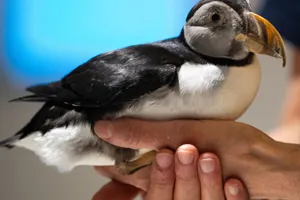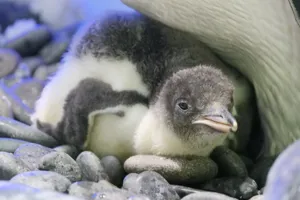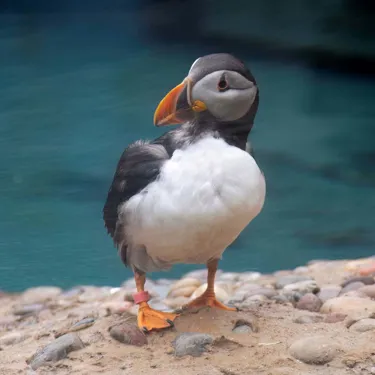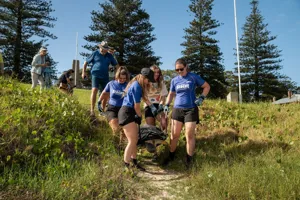Puffin & Penguin Care
At SEA LIFE, we’re proud to care for and protect seabirds around the world—from the tiny pufflings rescued by the Puffling Patrol in Iceland to the majestic king penguins in our global aquariums. The Beluga Whale Sanctuary is home to Iceland’s only Puffin Rescue Centre, where injured or orphaned puffins receive expert care and, when possible, are released back into the wild. Meanwhile, our world-class penguin breeding programmes and conservation partnerships help safeguard five incredible penguin species and their habitats for generations to come.

Puffin Rescue in Iceland
The Beluga Whale Sanctuary is home to Iceland´s only Puffin Rescue Centre, which takes in pufflings (baby puffins) and puffins found in Vestmannaeyjar which need some extra care. Most of these birds are rescued by the local Puffling Patrol, which works in cooperation with the Sanctuary. Some are brought in by local residents for review, treatment and possibly release if they are fit and ready. Admission to our visitor centre and donation help support the care of injured puffins, as well as those which cannot be released.
Find out more

Supporting SANCCOB
The African Penguin is a Critically Endangered species of penguin, that’s wild population has declined over 50 percent since the late 1970s! SEA LIFE send a team of animal experts to volunteer time at Southern African Foundation for the Conservation of Coastal Birds (SANCCOB). Located in Cape Town, South Africa, SANCCOB aim to reverse the decline the African Penguin population through rescue, rehab and release of ill, injured or abandoned birds.
You can help African penguins by supporting penguin conservation groups like SANCCOB, and by making more sustainable seafood choices at restaurants and grocery stores.
Find out more

Puffin Care in Cornwall
At the Cornish Seal Sanctuary, we’re proud to provide a safe and loving forever home to ten charming puffins who recently arrived from the Beluga Whale Sanctuary in Iceland. These pint-sized seabirds, each with their own unique personality, are non-releasable due to various injuries and health conditions that require lifelong care. Our dedicated SEA LIFE animal care team ensures they receive expert attention, enrichment, and a peaceful environment tailored to their needs. While they may no longer soar across the North Atlantic, they now thrive in a sanctuary where their wellbeing is our top priority
Donate to support

Supporting Penguin Conservation
SEA LIFE is actively involved in supporting penguin conservation both locally and internationally. At Kelly Tarlton’s SEA LIFE Aquarium in New Zealand, we are working alongside the New South Wales National Parks and Wildlife Service in Australia to rehabilitate habitats for local fairy penguin populations. This includes removing invasive weeds and replanting native vegetation to restore their natural environment. Additionally, Weymouth SEA LIFE Park supports global penguin conservation by donating to Sphenisco, an organisation dedicated to protecting Humboldt penguins in their native habitats along the South American coast. These efforts help safeguard vital breeding grounds and promote the long-term survival of vulnerable penguin species.

Penguin breeding programmes
SEA LIFE’s penguin breeding programmes play a vital role in maintaining sustainable, healthy populations within our aquariums. These programmes not only support conservation but also help educate visitors about penguins and the threats they face in the wild. We currently breed five species, including the Critically Endangered African penguin (Spheniscus demersus) and the Vulnerable Humboldt penguin (Spheniscus humboldti), both of which face serious risks due to habitat loss, climate change, and declining food availability. Through responsible breeding and engaging public education, we aim to raise awareness and support for their protection.
Find out more
Waddle you know?

Smelly!
Penguin poo is called 'guano'! And some penguins can poop every 20 minutes.

A camo tuxedo!
Penguin's black-and-white colouring is a form of countershading that helps them blend in while swimming—white belly from below, black back from above.

Nicknamed “sea parrots.”
Thanks to their colourful beaks and bright orange feet, puffins are often called the “clowns of the sea” or “sea parrots.”

Sky & Sea
Puffins are amazing flyers and swimmers. They flap their wings up to 400 times per minute and can dive as deep as 60 meters to catch fish!

Our latest news
Dive in and discover our latest news, stories and fun facts from all around the globe!
Dive in